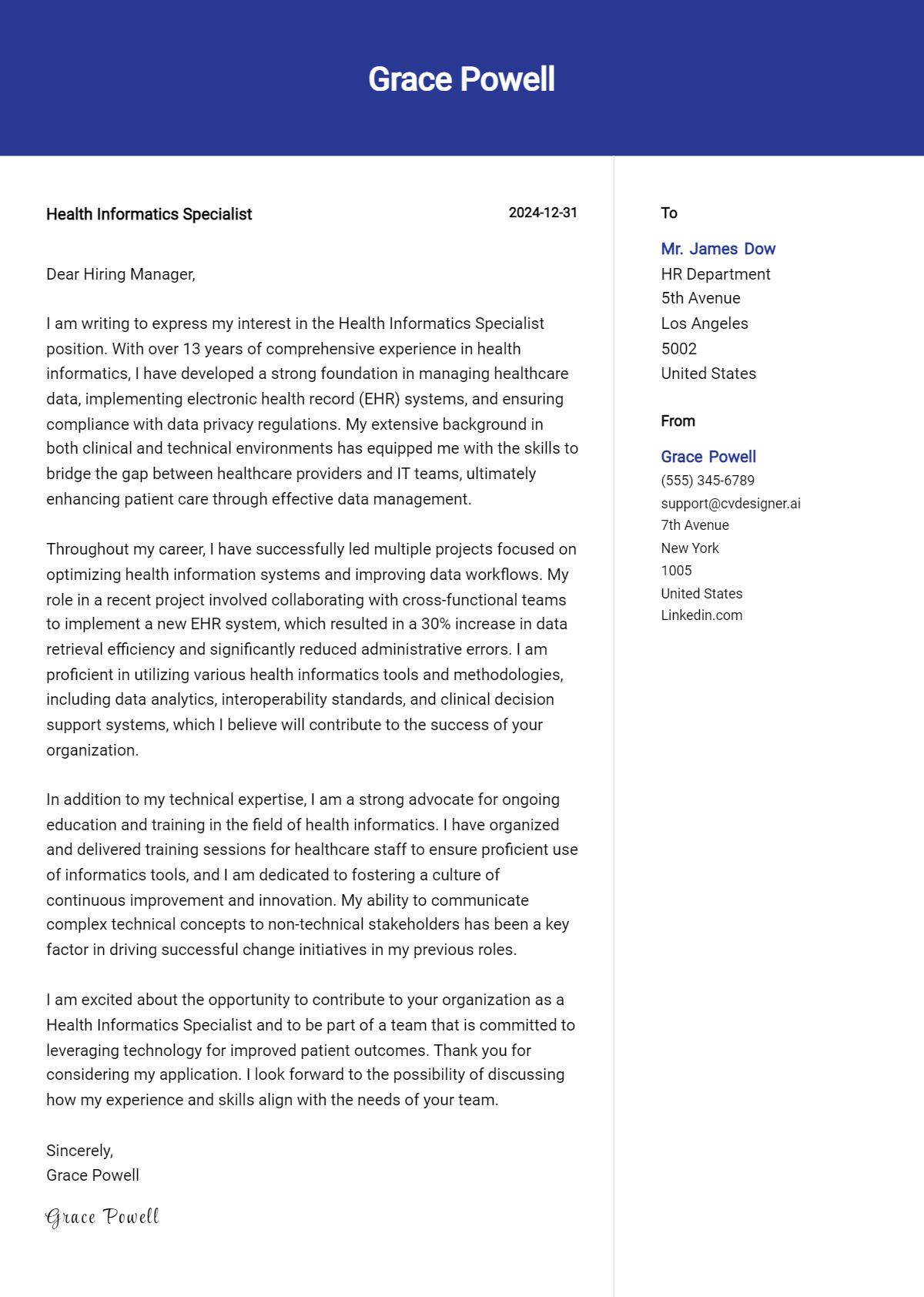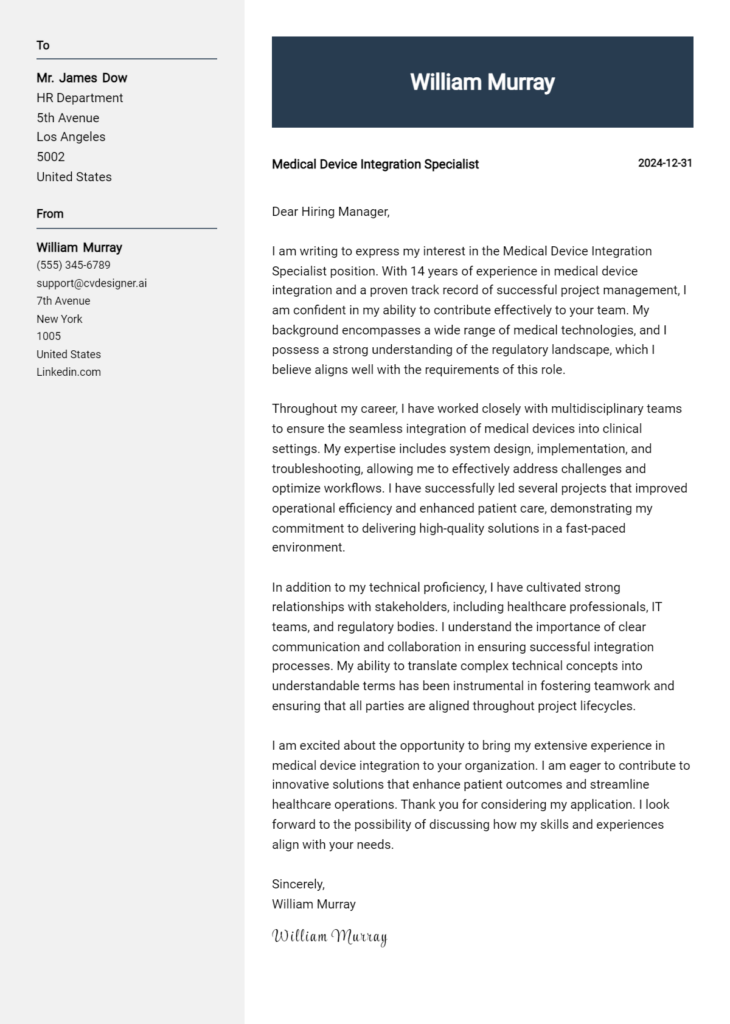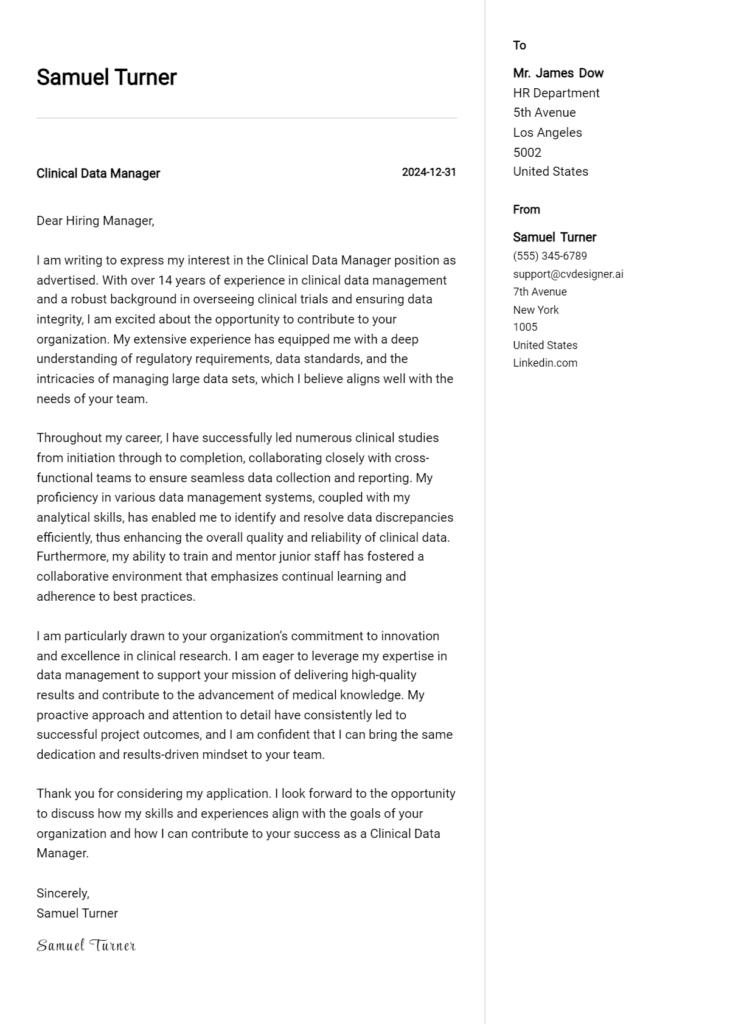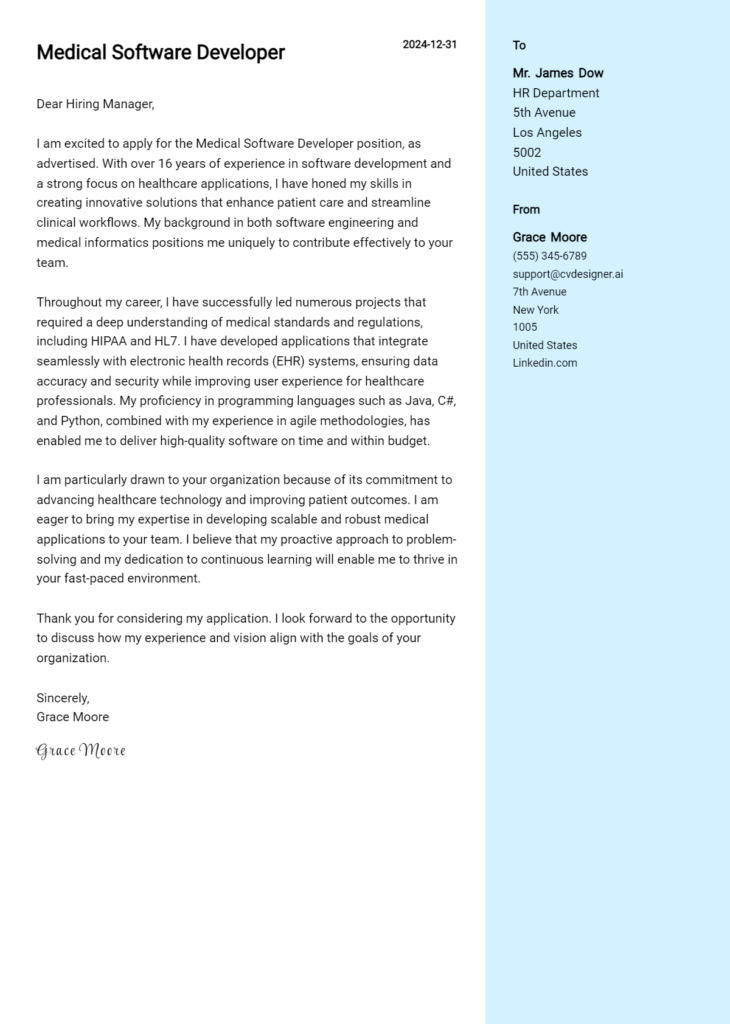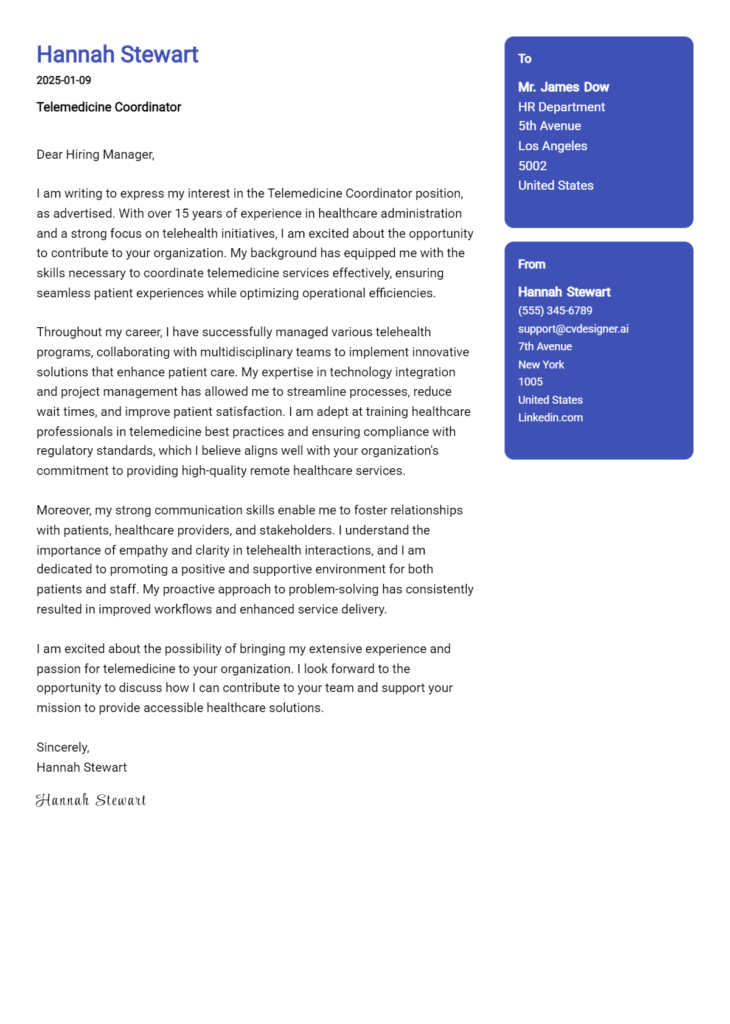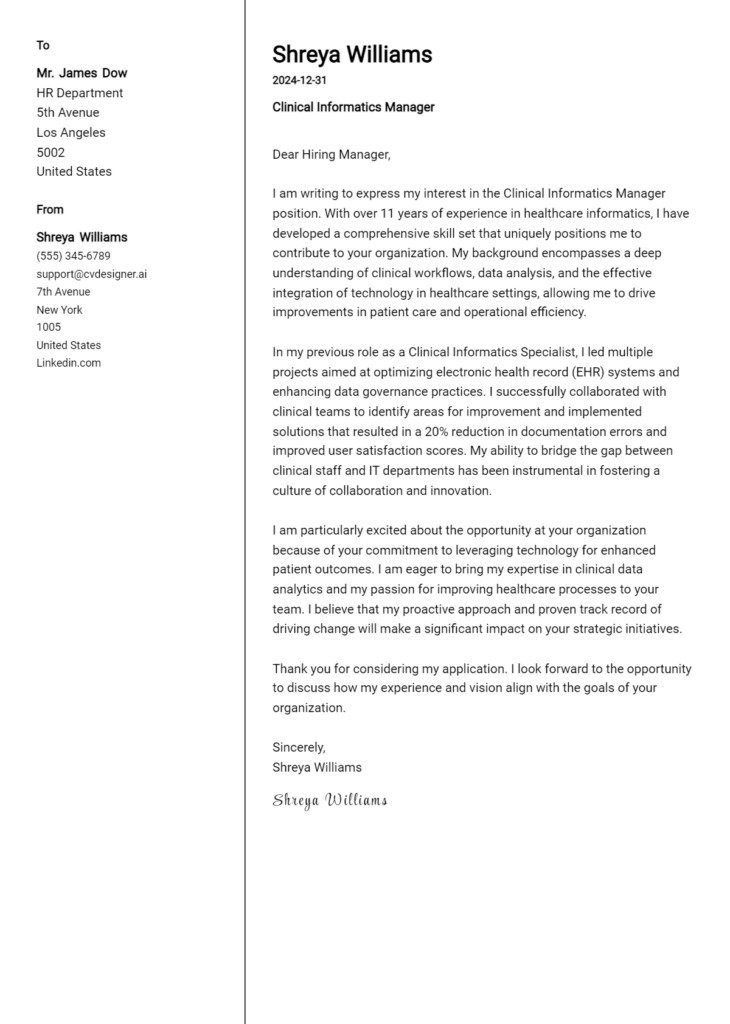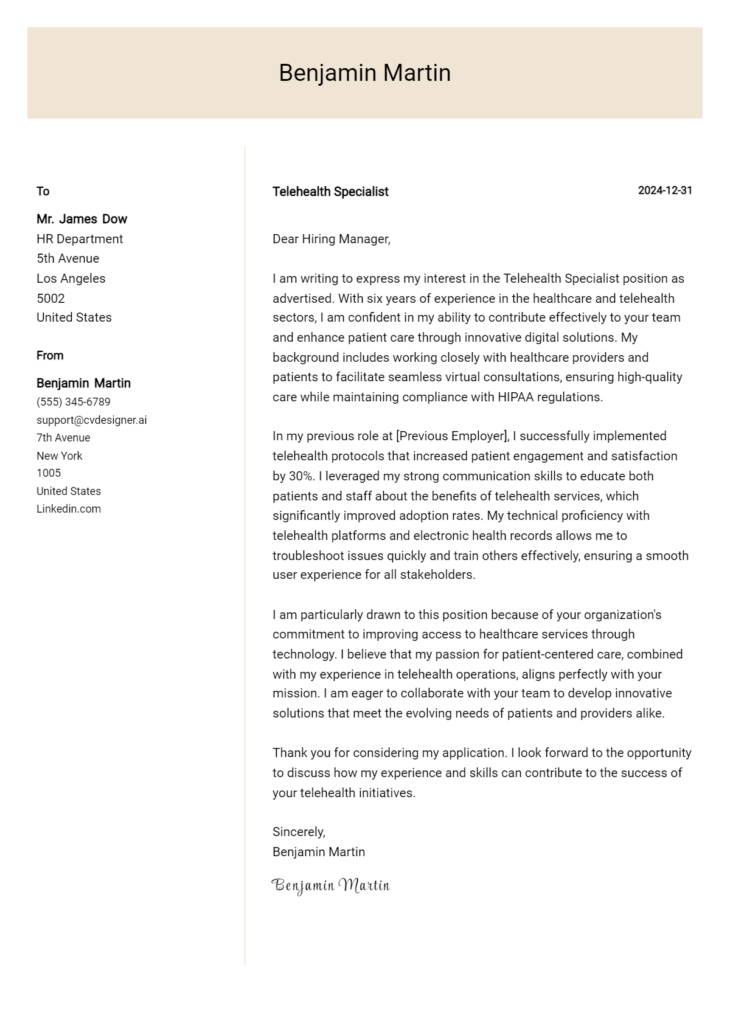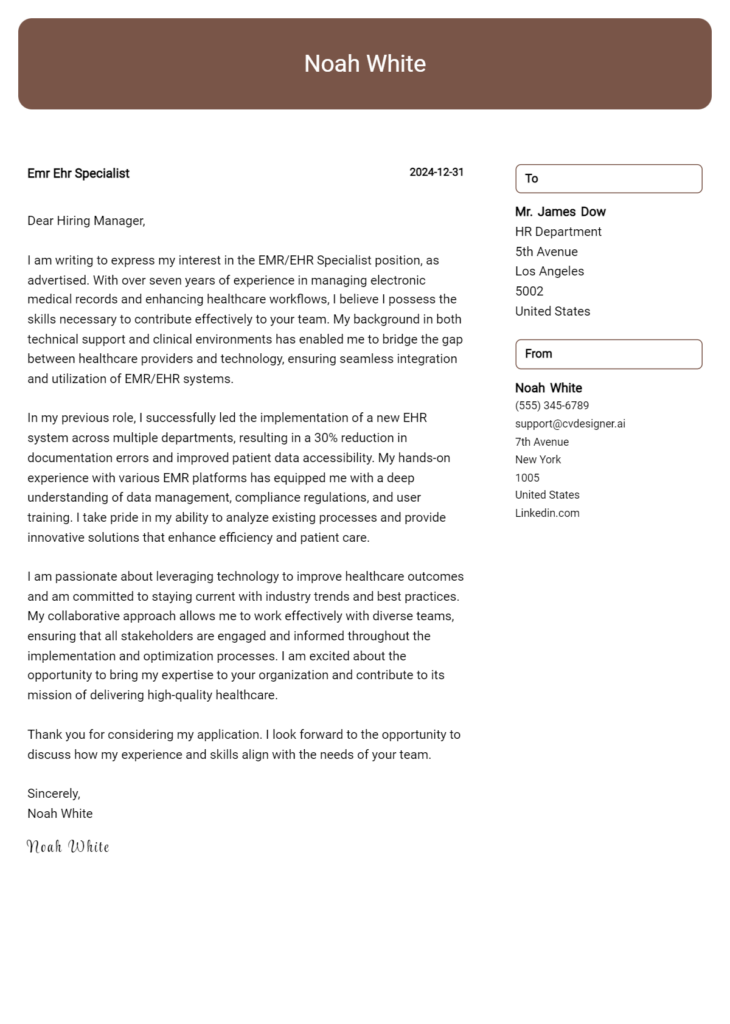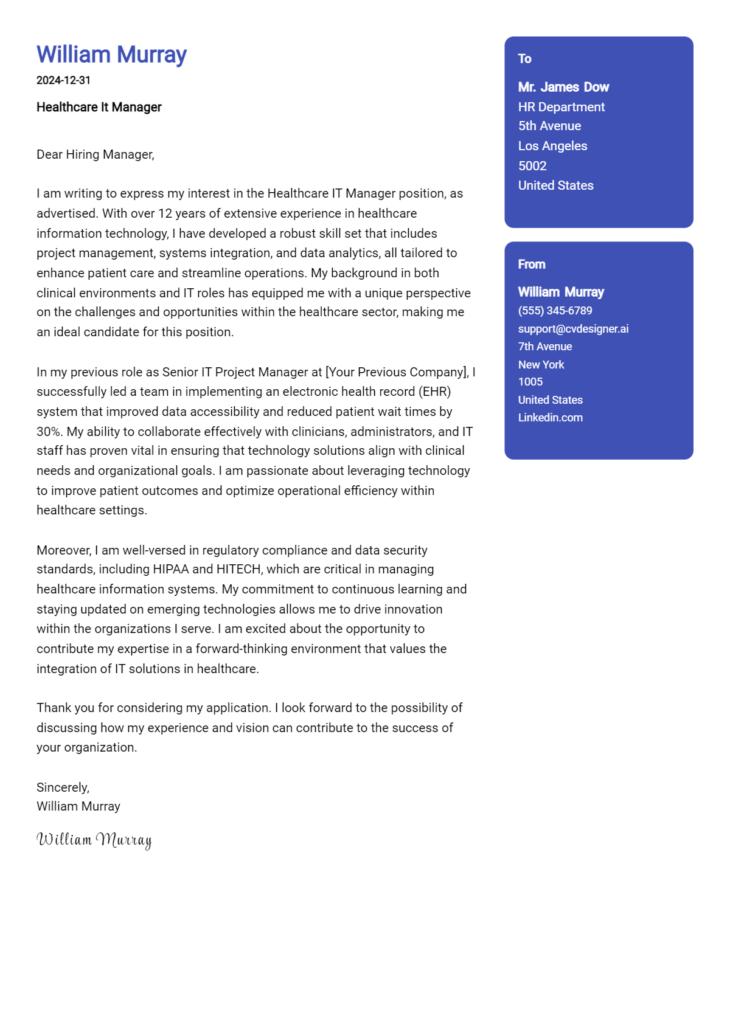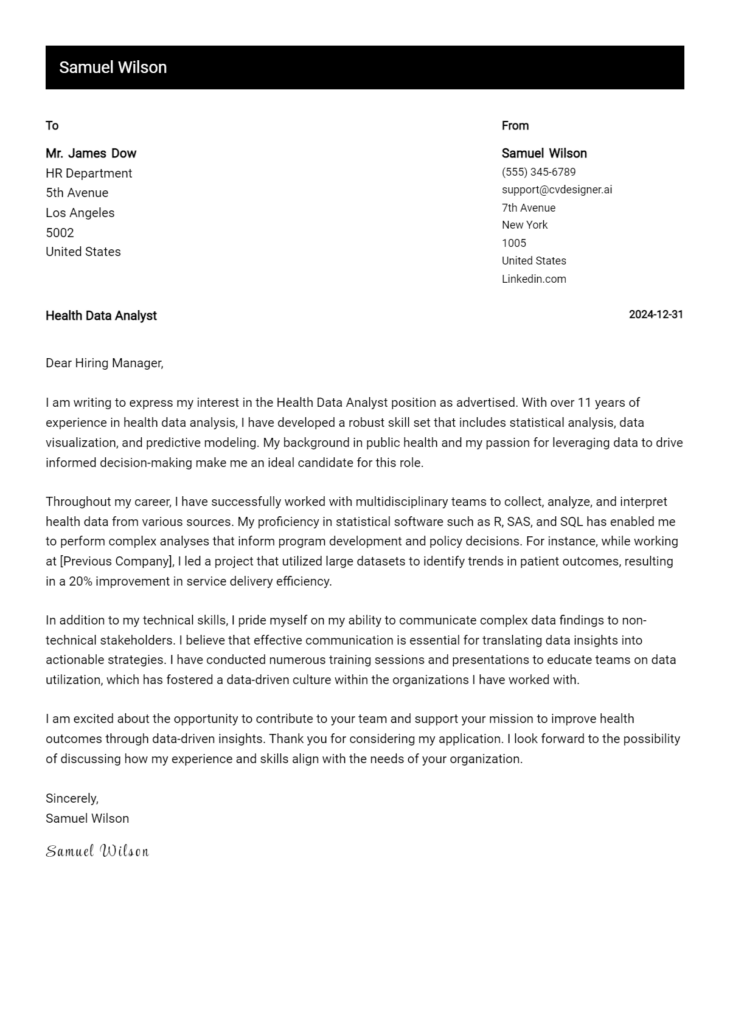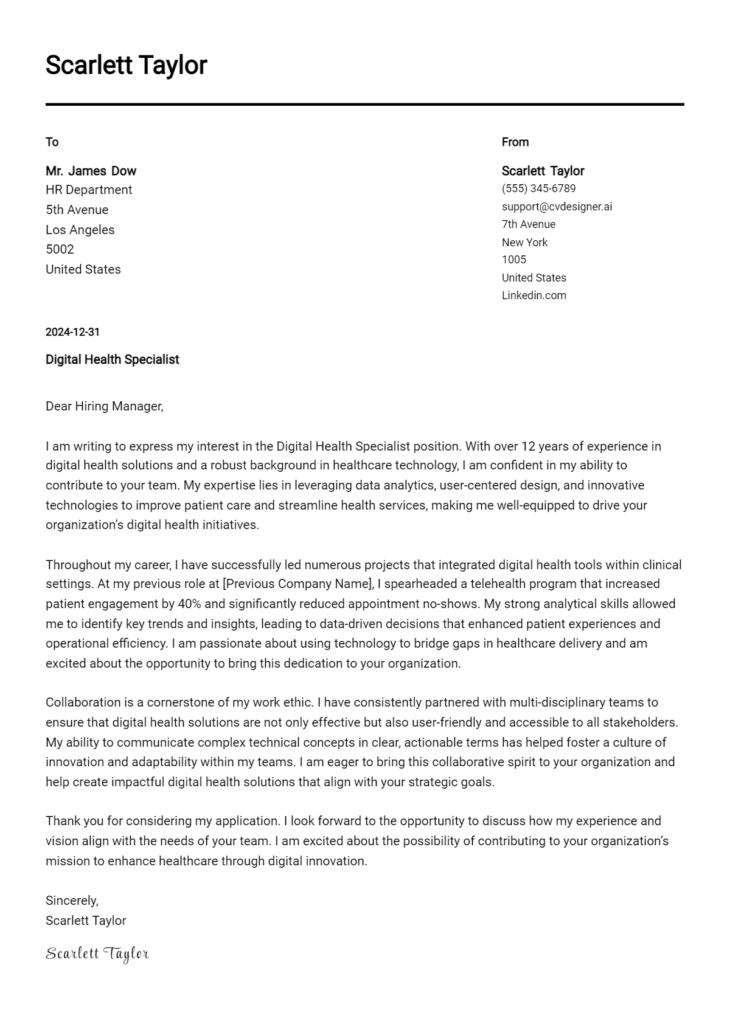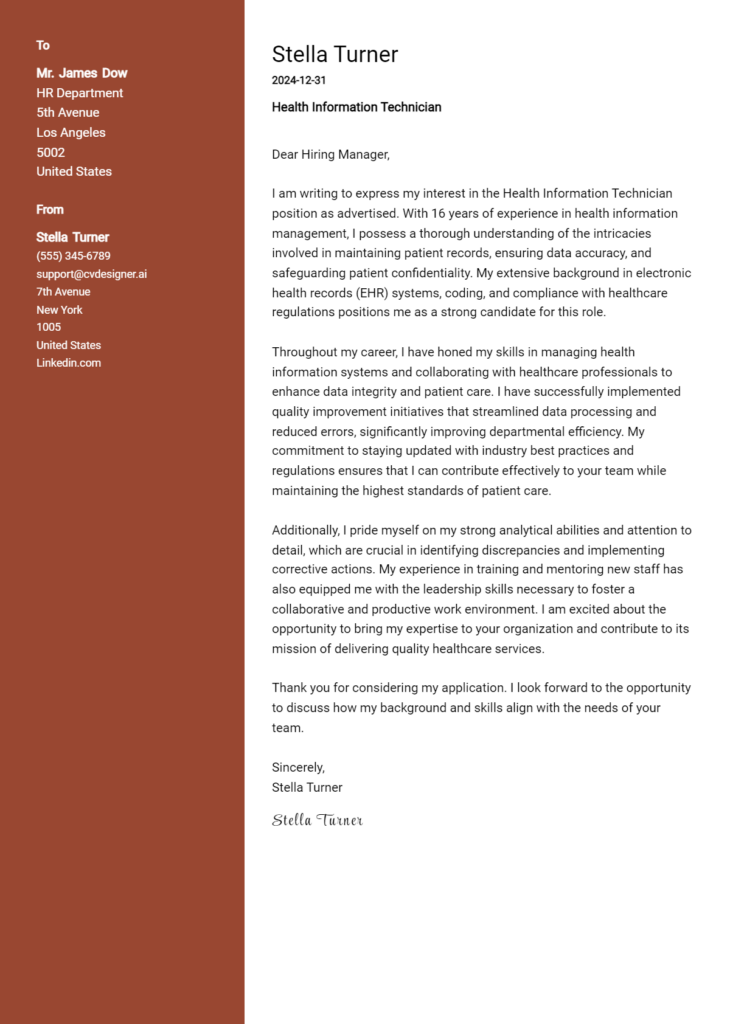Health Informatics Specialist Cover Letter Examples
Explore additional Health Informatics Specialist cover letter samples and guides and see what works for your level of experience or role.
How to Format a Health Informatics Specialist Cover Letter?
Crafting a compelling cover letter is a crucial step for Health Informatics Specialists, as it's an opportunity to showcase your expertise at the intersection of healthcare and technology. Effective formatting not only enhances readability but also demonstrates your organizational skills and attention to detail—qualities that are essential in this field. A well-structured cover letter allows you to highlight your technical competencies, analytical abilities, and understanding of healthcare systems, making a strong case for your candidacy.
In this guide, we will outline the key components of a professional cover letter, including:
- Cover Letter Header
- Cover Letter Greeting
- Cover Letter Introduction
- Cover Letter Body
- Cover Letter Closing
Each section is designed to present your qualifications in the best light, ensuring that you make a lasting impression on hiring managers. Let’s delve into the specifics of each part and explore how to make your cover letter stand out in the competitive field of health informatics.
Importance of the Cover Letter Header for a Health Informatics Specialist
A well-structured cover letter header is crucial for any job application, including that of a Health Informatics Specialist. It serves as your first impression and sets the tone for the entire letter. The header should include your contact information, the date, and the recipient's details, all formatted clearly and professionally. This ensures that the hiring manager can easily identify who you are, when you applied, and how to contact you. Clarity and professionalism in the header not only reflect your attention to detail but also your understanding of the healthcare industry's standards.
Here are examples of a strong and weak cover letter header for a Health Informatics Specialist:
Strong Example
John Doe 123 Health Lane Cityville, ST 12345 (123) 456-7890 johndoe@email.com October 1, 2023 Jane Smith Hiring Manager Health Innovations Inc. 456 Wellness Blvd Cityville, ST 12345
Weak Example
john d. 10/1/2023 health innovations 456 blvd cityville
The Importance of the Cover Letter Greeting
The greeting of your cover letter plays a crucial role in establishing the tone for the rest of your application. A well-crafted greeting not only showcases your professionalism but also adds a personal touch by directly addressing the hiring manager. This can create a positive first impression and set you apart from other candidates who may use more generic salutations. To enhance the effectiveness of your greeting, it is advisable to avoid generic phrases like "To Whom It May Concern." Instead, take the time to research the hiring manager's name, which can often be found on the company's website or LinkedIn. This small effort demonstrates your genuine interest in the position and the organization.
Strong Greeting Example
Dear Dr. Jane Smith,
Weak Greeting Example
To Whom It May Concern,
The Importance of a Compelling Cover Letter Introduction for a Health Informatics Specialist
A well-crafted cover letter introduction is crucial for a Health Informatics Specialist as it sets the tone for the entire application. This opening paragraph serves as the first impression a hiring manager will have of the candidate, making it essential to capture their attention immediately. A strong introduction should not only express the candidate's enthusiasm for the role but also succinctly highlight relevant skills or achievements that align with the job's requirements. By doing so, candidates can create a compelling narrative that encourages hiring managers to read further into their qualifications. Below are examples of strong and weak cover letter introductions for a Health Informatics Specialist position.
Strong Example
Dear [Hiring Manager's Name], As a dedicated Health Informatics Specialist with over five years of experience in data analytics and electronic health record management, I am excited to apply for the position at [Company Name]. My passion for utilizing technology to improve patient outcomes, combined with my proven track record of implementing data-driven solutions that enhance clinical workflows, equips me to contribute effectively to your team. I am eager to leverage my expertise to support [Company Name]'s mission of advancing healthcare through innovative informatics solutions.
Weak Example
To Whom It May Concern, I am writing to apply for the Health Informatics Specialist position. I think it is a good job, and I have some experience in healthcare. I hope to bring my skills to your company, and I am looking forward to the opportunity to work with you.
Purpose of the Cover Letter Body for a Health Informatics Specialist
The body of a cover letter for a Health Informatics Specialist serves to effectively communicate the candidate's relevant skills, experiences, and the value they can bring to the organization. This section should highlight specific projects or accomplishments that demonstrate the candidate's ability to manage health data systems, improve patient outcomes, and streamline healthcare processes. The use of concrete examples allows potential employers to understand the candidate's expertise in health informatics and their potential contributions to the company's goals.
Strong Example
I am particularly proud of a project I led at XYZ Health Systems, where I implemented an electronic health record (EHR) optimization initiative that resulted in a 30% decrease in patient data entry errors and improved clinician satisfaction scores by 25%. My role involved collaborating with cross-functional teams to analyze workflow processes, identify bottlenecks, and design targeted training programs for staff. This experience not only honed my technical skills in health informatics but also strengthened my ability to effectively communicate complex concepts to diverse stakeholders. I am excited about the opportunity to bring my expertise in data management and process improvement to your organization.
Weak Example
I have worked in health informatics for a few years and have done some projects. I think I would be a good fit for your team. I am familiar with EHR systems and have helped with training some staff. I also like working with data and hope to improve it for your company.
Importance of the Cover Letter Closing for a Health Informatics Specialist
The closing paragraph of a cover letter is crucial as it serves as the final opportunity to reinforce your qualifications and express enthusiasm for the Health Informatics Specialist role. A strong closing summarizes key qualifications, reiterates interest in the position, and encourages the next steps, such as reviewing the resume or scheduling an interview. This part should leave a lasting impression and motivate the hiring manager to take action. Below are examples of strong and weak closing paragraphs for a cover letter.
Strong Example
In conclusion, my extensive background in health informatics, combined with my passion for improving healthcare delivery through data-driven insights, makes me an ideal candidate for this role. I am excited about the opportunity to contribute to your team's mission and to leverage my skills in data analysis and electronic health records management. I look forward to the possibility of discussing how my experience aligns with the goals of your organization. Thank you for considering my application; I hope to discuss my candidacy further in an interview.
Weak Example
Thank you for reading my cover letter. I think I might be a good fit for the Health Informatics Specialist position, but I’m not sure. Please look at my resume if you want. I hope to hear from you soon, but no rush.
When applying for a position as a Health Informatics Specialist, crafting a compelling cover letter is crucial to making a strong first impression. This document acts as your introduction to potential employers, allowing you to highlight your unique qualifications and demonstrate your fit for the role. It’s essential to showcase your technical skills, problem-solving abilities, knowledge of the Software Development Life Cycle (SDLC), teamwork capabilities, and a passion for continuous learning. Here are some tips to help you create an effective cover letter that stands out:
Tips for Crafting Your Cover Letter
Highlight Technical Skills
Clearly outline your technical skills relevant to health informatics, such as proficiency in electronic health records (EHR), data analysis tools, or programming languages like SQL and Python. Use specific examples from your past work experiences to illustrate how these skills have contributed to successful projects. This will help employers recognize your technical expertise right from the start.Demonstrate Problem-Solving Abilities
Employers value candidates who can identify challenges and develop effective solutions. Share a brief anecdote that showcases your problem-solving skills in a health informatics context. For instance, discuss a time when you improved data management processes or resolved discrepancies in patient data. This will illustrate your analytical mindset and ability to navigate complex issues.Showcase Your Knowledge of the SDLC
Understanding the Software Development Life Cycle is vital in health informatics. Mention any experience you have with phases of the SDLC, such as requirements gathering, design, implementation, or testing. Highlight specific projects where you played a role in these stages, which demonstrates your familiarity with the processes that drive successful health informatics initiatives.Emphasize Teamwork and Collaboration
Health informatics often involves working with multidisciplinary teams. Share your experience collaborating with healthcare professionals, IT staff, or administrative teams to achieve a common goal. Providing examples of how you effectively communicated and collaborated can illustrate your ability to work well within a team environment, a critical aspect of this role.Express a Passion for Continuous Learning
The field of health informatics is constantly evolving, making continuous learning essential. Mention any relevant certifications, courses, or conferences you’ve attended that demonstrate your commitment to staying updated with industry trends and advancements. This not only shows your dedication but also positions you as a proactive candidate who is eager to grow in the field.
By incorporating these tips into your cover letter, you can effectively convey your qualifications and enthusiasm for the Health Informatics Specialist role. For more assistance, consider using cover letter templates or a cover letter builder to create a polished and professional document.
Common Mistakes to Avoid in a Health Informatics Specialist Cover Letter
Crafting a compelling cover letter is essential for standing out in the competitive field of health informatics. Avoiding common mistakes can significantly increase your chances of making a positive impression. Some frequent pitfalls include:
Generic Content: Using a one-size-fits-all approach can make your letter seem impersonal. Tailor your content to the specific role and organization to demonstrate genuine interest.
Neglecting to Highlight Relevant Skills: Failing to emphasize skills relevant to health informatics, such as data analysis or knowledge of health information systems, can weaken your application. Always align your qualifications with the job description.
Poor Formatting: A cluttered or unprofessional layout can detract from your message. Follow a clear cover letter format to ensure your document is easy to read and visually appealing.
Excessive Length: Cover letters should be concise, ideally one page. Avoid the temptation to include every detail of your experience; focus on key achievements that directly relate to the role.
Ignoring Proofreading: Spelling and grammatical errors can undermine your professionalism. Always proofread your letter multiple times or enlist a friend to help catch mistakes.
Lack of Enthusiasm: A cover letter should convey your passion for the field. Avoid a monotone approach; instead, express your excitement about the opportunity and the impact you hope to make.
Overly Formal Language: While professionalism is important, using overly formal language can make your writing seem stiff. Strive for a conversational tone that still maintains professionalism.
By avoiding these common mistakes and ensuring your cover letter is polished and tailored, you can effectively showcase your qualifications as a Health Informatics Specialist. For inspiration, consider reviewing various cover letter examples to see how successful candidates present their skills and experiences.
Cover Letter FAQs for Health Informatics Specialist
What should I include in my cover letter as a Health Informatics Specialist?
Your cover letter should highlight your relevant experience, skills, and accomplishments in the field of health informatics. Start by introducing yourself and stating the position you are applying for. Include specific examples of how your background in data analysis, health information systems, or project management aligns with the job requirements. Mention any certifications, such as Certified Health Data Analyst (CHDA) or Certified Professional in Healthcare Information and Management Systems (CPHIMS), that add value to your application. Finally, express your enthusiasm for the role and how you envision contributing to the organization’s goals.
How can I demonstrate my technical skills in the cover letter?
To effectively demonstrate your technical skills, provide concrete examples of projects or tasks where you utilized specific technologies or methodologies relevant to health informatics. For instance, mention your experience with electronic health records (EHR) systems, data analytics tools, or healthcare interoperability standards. Additionally, discuss the outcomes of these projects, such as improved patient care or enhanced data reporting capabilities. By quantifying your contributions, you show potential employers the tangible impacts of your skills, making your cover letter more compelling.
How should I tailor my cover letter for different employers?
Tailoring your cover letter involves researching each employer to understand their unique needs and values. Start by reviewing the job description closely to identify key skills and qualifications they seek. Use this information to emphasize the experiences and skills from your background that align with those requirements. Additionally, incorporate the organization’s mission or recent projects into your letter to demonstrate your genuine interest. Customizing your cover letter for each application shows employers that you are dedicated and have taken the time to understand their specific context, making you a more attractive candidate.
What are common mistakes to avoid in a cover letter for a Health Informatics Specialist?
Common mistakes include being overly generic, failing to proofread, and neglecting to highlight your accomplishments. Avoid using a template that doesn’t reflect your qualifications or the specific position; instead, personalize your content. Additionally, typos or grammatical errors can undermine your professionalism, so it’s crucial to proofread your letter carefully. Lastly, don’t just list job duties—focus on your achievements and how they relate to the prospective employer's goals. By steering clear of these pitfalls, you enhance your chances of making a strong impression on hiring managers.
Build your Cover Letter in minutes
Use an AI-powered cover letter builder and have your letter done in 5 minutes. Just select your template and our software will guide you through the process.

